Hundreds of migrants living in squalor in warehouse in Belarus amid ongoing border crisis
People are living on shelves in the packing warehouse.
BRUZGI, Belarus -- Parsa Akram now lives with her mother, father and brother under a warehouse shelf. The space is about 2 meters wide. The 18-year-old and her mother sleep in a tent, her brother and father on the ground.
They are among hundreds of people -- mostly from Iraqi Kurdistan -- now living in a warehouse about a mile from Belarus' border with Poland, caught up in the migration crisis that, although eased, has not ended.
The warehouse in Bruzgi is not a refugee center; it is just a packing warehouse, the kind Amazon or FedEx would use to store goods. People are now living on the stacks of shelves that would normally hold packages. Whole families like the Akrams are packed into the spaces under the shelving; others have clambered up to make nest-like beds in the higher levels.
"It's not a camp," Parsa said. "[It's] a chicken house!"
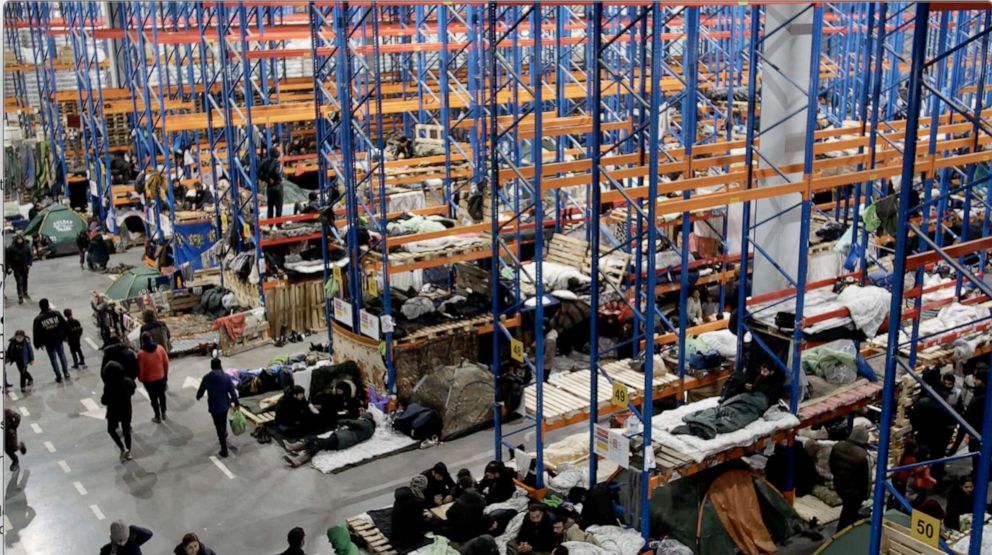
For months, thousands of migrants, mostly from the Middle East, have found themselves trapped between Belarus and Poland amid a crisis allegedly engineered by Belarus' authoritarian leader, Alexander Lukashenko, who is accused of luring them to Europe's border in an effort to retaliate against the European Union for its support for Belarus' pro-democracy movement.
The migrants, mainly trying to reach western Europe, have been blocked by Poland and neighboring Lithuania, stranding them in forests along the border often for weeks, without food or shelter.
The crisis came to a head three weeks ago, when Belarus marched hundreds of migrants to a crossing point with Poland. Scenes of migrants sleeping in the open air in freezing temperatures and then violent clashes with Polish border guards, that Belarus was accused of inciting, attracted global attention.
Following the clashes, Belarus moved about 2,000 of the migrants to the warehouse, raising hopes the crisis might be easing.
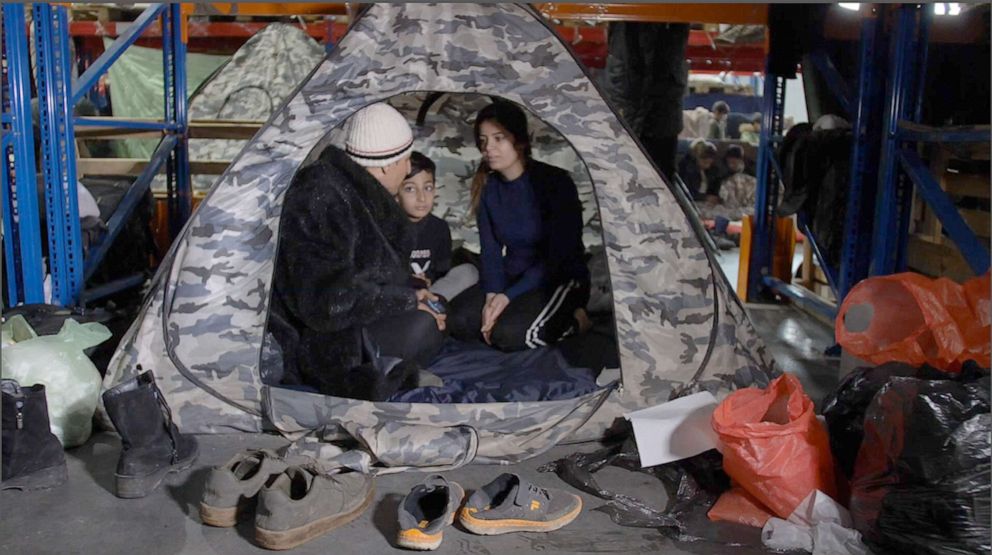
Although better than the forest, the warehouse is not set up to house hundreds of people and after two weeks, conditions inside have rapidly deteriorated. When ABC News reporters visited this weekend, people were sleeping on the floor in sleeping bags and sometimes thin tents, huddled together in dirty clothes. There is almost no sanitation, just a few chemical toilets. People wash themselves from two portable water tanks set up in a yard slick with mud and slush.
There are dozens of children, including some a few months old, and pregnant women.
This week, Belarus' military brought a mobile sauna in a tent to allow people to wash, for many, the first time in a month. Belarus is also feeding people, giving them portions of buckwheat porridge twice a day. Food trucks, selling bread and snacks, are also set up.
Many people in the camp said they were sick. Several told ABC News they were suffering from food poisoning that they blamed on expired tinned food they said Belarusian authorities had given them.
There are also fears COVID-19 is in the camp. Belarusian authorities -- who have been accused of undercounting COVID cases more generally -- claim only two cases have been recorded in the warehouse. But the sound of coughing there is constant and ABC News reporters met a man being hospitalized with pneumonia on Sunday.
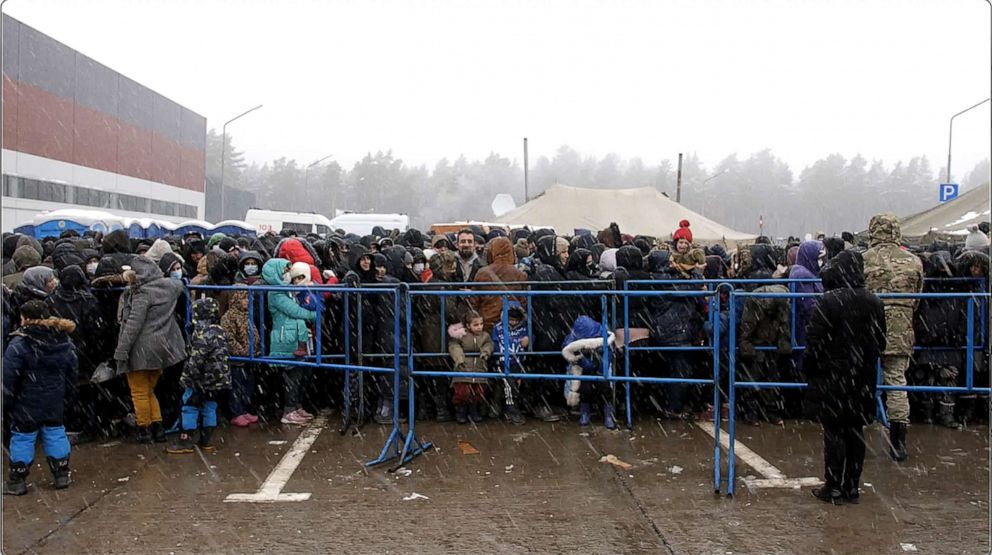
"People cannot wait any longer because the weather is getting really really cold. And all the people in here, they're all sick, they're getting sick so bad," said Zanyar Dishad, an 18-year-old from Kurdistan who was with his family.
Lukashenko visited the camp last Friday, accompanied by state television cameras. In a speech, he told the migrants he would not force them to go home and would do everything to help them reach Europe. He also demanded Poland and Germany take them in.
Belarusian authorities told the migrants European countries will soon take them, though there is no indication when or if this will happen. Several migrants said they believed Lukashenko was holding talks with the EU to get them across the border and many were unaware of the reasons behind his conflict with Europe.
"He's a very good man," said Karwan Jamal, 26, who is living now in a tent with his wife and 7-year-old son.
"He's very kind," his wife Narin added. "Because Belarus all the time helps all people in here."
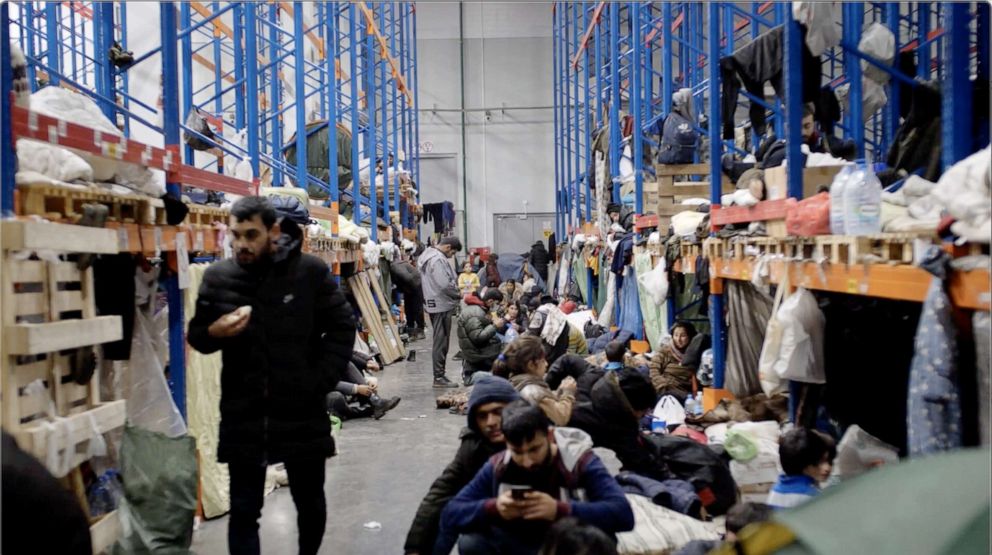
In reality, Belarusian authorities refused to allow migrants out of the forests for weeks. Migrants in recent weeks have told ABC News that Belarusian border guards beat and robbed them, forcing them to cross back into Poland after being pushed back.
But EU efforts to cut off the flow of migrants to Belarus seem to be having an effect. The number of new arrivals has sharply and visibly dropped off. Belarus also appears to now be allowing people to leave the border area.
Hundreds of Iraqi citizens have also returned home in the last week on voluntary repatriation flights organized by Iraq's government, which said 1,800 people have returned already.
Among them was Balsam Khalaf, 51, who said he had given up after five months of being pushed back and forth across the border, saying he had been roughed up by Belarusian, Polish and Lithuanian guards.
"We turned to a bouncing ball between both sides," he said in an interview in Baghdad this week.
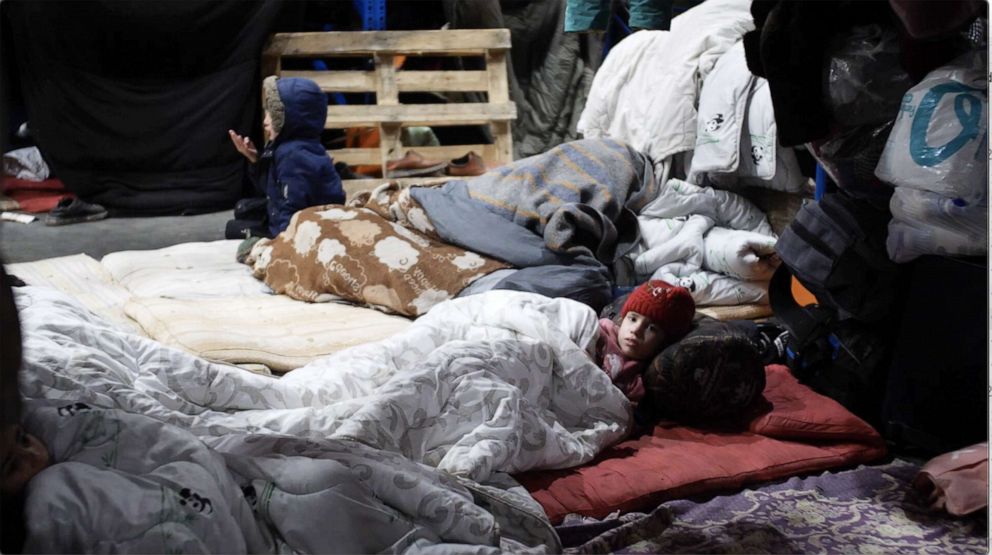
It is unclear how many migrants are still in Belarus, but it estimated to be at least a few thousand, including in the forests. Polish authorities accuse Belarus' security forces of continuing to try to push dozens of people across the border each night.
Iraq's government said it would hold a final repatriation flight this week because it said no one else wished to return. It said 3,000 people in total had expressed a desire to return.
At the camp, most people said they would not go back, despite the wretched conditions.
"Never ever," said Narin.
ABC News' Bader Katy contributed to this report from Baghdad and Tanya Stukalova contributed from Bruzgi, Belarus.




